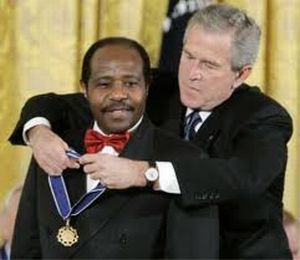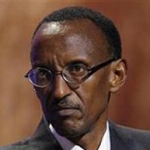Le juge antiterroriste Marc Trevidic, chargé, à la suite du juge
Bruguière, d’enquêter sur les responsables de l’attentat qui, le 6 avril
1994 a coûté la vie aux présidents du Rwanda et du Burundi ainsi qu’à
l’équipage français du Falcon, a bouclé son instruction et il se prépare
à rendre publiques, en janvier probablement, les conclusions des
experts qui, en septembre 2010 l’avaient accompagné sur le terrain.
En attendant ce verdict, rumeurs et aveux, feux et contrefeux se
croisent, à Kigali et dans les capitales européennes. Au Rwanda, où neuf
haut responsables avaient été mis en cause par le juge Bruguière,
nombre de nos interlocuteurs espèrent qu’un non lieu sera prononcé. Par
contre, depuis les Etats Unis, où il est réfugié politique, l’un des
anciens compagnons de Kagame, Théogène Rudasingwa, qui fut secrétaire
général du Front patriotique rwandais, a déclaré à la BBC qu’ « en
juillet 1994,avec son insensibilité caractéristique et beaucoup de
jubilation, Kagame m’a dit qu’il était responsable de l’attentat contre
l’avion. » Et d’ajouter: « comme bon nombre au sein de la direction du
FPR, j’ai vendu avec enthousiasme cette version trompeuse de l’histoire.
(…) »
Après s’en être tenu durant 17 ans à la version officielle de
Kigali, Rudasingwa, l’un des fondateurs du CNR (Congrès national
rwandais), un mouvement d’opposition qui regroupe d’anciens réfugiés
tutsis membres du FPR et des Hutus en exil, assure donc regretter
d’avoir menti durant 17 ans !
Ses accusations tardives pèseront sans doute moins dans la balance
que les conclusions des experts convoqués par le maguistrat français,
qui ont tenu à arpenter les « lieux du crime », des lieux naguère
familiers et que nous avons redécouverts après 17 années.
Hérissée de gratte ciels, de maisons à étages, Kigali est
méconnaissable. Mais du côté de l’aéroport de Kanombe, en passe d’être
détrôné par un « hub » aérien qui se construit dans le Bugesera, le
paysage n’a pas changé. Au delà des constructions de l’aéroport, on
devine un vaste camp militaire, celui là même qui abritait jadis la
garde présidentielle, dernier carré des fidèles du chef de l’Etat. Plus
loin, jouxtant le camp, la villa de l’ancien président a été transformé
en musée.
Au rez de chaussée, une jeune femme fait les honneurs d’une
exposition de photos couleur sépia, de vieux clichés qui rappellent le
Rwanda d’autrefois, les spectaculaires coiffures de tresses, la grâce
des danseuses et la majesté des Mwami posant devant leur rugo, leur
hutte de paille. A l’étage, sans états d’âme, notre guide nous introduit
dans la chambre à coucher, la chapelle, la chambre des enfants ; elle
fait jouer les parois de bois qui dissimulaient un passage secret et
explique que l’ancien président, qui craignait toujours pour sa vie,
avait placé des alarmes dans chacune des marches de l’escalier « afin
d’entendre les intrus qui se seraient introduits de nuit… »
En face de l’ancienne salle à manger, la piscine est toujours aussi
ombragée, la pelouse aussi verte. C’est ici que, le 6 avril 1994, à 20
heures 30, alors qu’il devait revenir de Tanzanie où il avait enfin
accepté d’appliquer les accords de paix qui prévoyaient de partager le
pouvoir avec le FPR, le président du Rwanda fut éjecté de son avion
Falcon touché par deux missiles et mourut avant d’arriver au sol.
Dans Kigali portée au paroxysme de la tension et de la haine, les
massacres étaient planifiés depuis longtemps, mais cet attentat fut
l’étincelle qui mit le feu aux poudres. Alors que dans les minutes qui
suivirent le crash, la ville se couvrait de barrières, les premières
tueries commençaient. C’était le début du génocide des Tutsis, du
massacre des Hutus qui refusaient l’extrémisme, le début de la mise à
mort d’un million de Rwandais.
Igor, un fonctionnaire rwandais, a suivi durant tout son séjour au
Rwanda le juge français Marc Trevidic. Ce dernier, au contraire de son
prédécesseur Jean-Louis Bruguière qui n’avait jamais fait le voyage, est
descendu sur le terrain accompagné d’experts français tandis que le
gouvernement rwandais avait sollicité des experts écossais. Le
traducteur rwandais nous rappelle quelques évidence relevées en sa
présence par les enquêteurs : « l’appareil, qui avait quitté la
Tanzanie, venait de l’Est et c’est sur le côté gauche qu’il fut touché
par deux tirs qui se sont suivis de près. L’avion, qui se trouvait en
phase d’atterrissage, est pratiquement tombé à la verticale, presque
sous les yeux de la famille du chef de l’Etat qui se trouvait dans le
salon et les corps de certains passagers ont été projetés dans les
arbres. »
Les experts ont examiné à la loupe la piscine, le jardin, la demeure
présidentielle, mesuré le point d’impact, calculé la vitesse probable
des deux missiles et essayé de déterminer l’angle du tir. Pour Igor, il
est certain que les missiles ont été tirés depuis l’est de la piste, et
les témoins qui se trouvaient dans l’ancienne tour de contrôle ont vu la
lieu orange du « départ » des projectiles.
D’autres témoins ont aussi entendu le bruit des deux tirs. Minutieux,
le juge d’instruction français a également pris l’avis de spécialistes
en acoustique. En effet, les souvenirs « auditifs » des témoins
devraient permettre de localiser le lieu d’où les tirs sont partis. A
cet égard, deux témoins européens sont importants : le Dr Pasuch, un
ancien coopérant militaire belge, et le colonel de Saint Quentin, un
coopérant militaire français. Les deux hommes vivaient dans l’enceinte
même du camp militaire.
Leurs souvenirs, détaillés au juge Trevidic, ont ravivé ceux de trois
médecins belges, les Dr V. père et fils et le Dr VDP qui, ce soir là,
étaient tranquillement installés dans un restaurant grec, du côté de
Kicukiro, sur la route de l’aéroport. Ils se rappellent que, vers 20
heures 30, un bruit énorme les fit sursauter, celui d’une déflagration,
« un bruit » nous disent-ils « qui n’avait rien à voir avec les grenades
auxquelles ils avaient fini par s’habituer… »
Depuis son salon, où il dînait en compagnie d’un ami, le Dr Pasuch
avait entendu la même chose : le bruit d’un tir, et ensuite celui du
crash.
Le premier rapport rédigé sur les activités du bataillon belge Kibat,
à la suite de la mort des dix Casques bleus belges, devait, par la
suite, confirmer le témoignage du Dr Pasuch. On y lit, entre autres, que
les tirs sont vraisemblablement partis du nord est de l’enceinte du
camp présidentiel.
Le colonel Grégoire de Saint Quentin fut le premier à se diriger vers
l’épave de l’avion. Des casques bleus belges, qui avaient tenté de
rejoindre les lieux du crash, expliquèrent par la suite à un enquêteur
militaire, qu’ils avaient vu, de loin, l’officier français s’emparer de
certaines pièces de l’appareil, peut-être la fameuse boîte noire, qui
fut tant recherchée par la suite et demeura introuvable.
Au contraire des autres témoignages, les souvenirs des trois dîneurs
belges, qui, au moment même, n’avaient pas mesuré l’importance
potentielle de leurs souvenirs, n’ont pas été portés la connaissance du
juge Trevidic.
A l’heure actuelle, tout Kigali estime qu’au vu des dépositions des
témoins oculaires, les experts convoqués par le juge français seront
obligés de conclure que les tirs ne sont pas, comme on l’a souvent dit,
partis de la colline de Masaka, située au sud du domaine présidentiel,
mais de l’enceinte même du camp militaire.
S’il se confirme, un tel constat ne permettra pas d’identifier les
tireurs mais il devrait en tous cas écarter une piste, celle d’un
commando issu du Front patriotique rwandais. En effet, compte tenu de
l’extrême tension, sinon de la paranoïa qui régnait à l’époque à Kigali,
il est exclu que des militaires tutsis (aisément repérables…) aient pu
s’infiltrer dans le « saint des saints », s’y installer, y perpétrer
leur coup pour, comme le concluait ingénument le juge Bruguière
« quitter ensuite les lieux en taxi…» A l’époque, seuls des militaires
de la garde présidentielle avaient accès à ce véritable camp retranché.
Rappelons que le sujet, depuis 17 ans, a représenté l’ « énigme »
sinon « le « mensonge » du siècle. En effet, alors que les premières
informations ou présomptions que « le Soir » avait recueilli sur place,
auprès des coopérants belges et de la communauté expatriée, mettaient en
cause des mercenaires « blancs », peut-être français, qui auraient
participé à un attentat soigneusement préparé, exécuté par une poignée
d’hommes qui n’auraient informé personne de leur projet, une autre thèse
se développa bientôt, selon laquelle les rebelles tutsis du Front
patriotique rwandais, dirigé par le général Paul Kagame, auraient choisi
d’éliminer le chef de l’Etat car ce dernier refusait de mettre en
œuvre les accords deArusha qui prévoyaient le partage du pouvoir.
Rudasingwa ne répète pas autre chose : selon lui, « en décidant
d’éliminer Habyarimana, Kagame a introduit une « wild card », une carte
sauvage, dans un cessez le feu déjà fragile, ce qui a créé un
puissant déclencheur, l’escalade d’un point de basculement vers la
reprise de la guerre, le génocide civil et la déstabilisation à
l’échelle régionale ».
Cette mise en cause du FPR, soutenue par des articles de presse
retentissants et de nombreux livres, avait mené à l’inculpation par le
juge anti terroriste Jean-Louis Bruguière de neuf hauts dirigeants
rwandais proches de Kagame et à la rupture des relations diplomatiques
entre la France et le Rwanda.
Des relations qui ont été restaurées par le président Sarkozy, et
dont le renouveau a été scellé en septembre dernier par la visite à
Paris du président rwandais.
Rappelons que c’est le Rwanda, qui, défendant Rose Kabuye, chargée
du protocole présidentiel et inculpée par Bruguière, a forcé la
réouverture du dossier et son réexamen par deux nouveaux juges, Marc
Trevidic et Nathalie Poux. Depuis cette contre offensive, l’édifice
soigneusement construit par Bruguière s’est effondré par pans entiers :
des témoins clés se sont rétractés, comme Abdul Ruzibiza (décédé depuis
lors) qui a reconnu qu’il n’était pas présent sur les lieux au moment
des faits, d’autres, comme Emmanuel Ruzindana ont assuré que le juge
leur avait forcé la main et fait signer un document auquel ils n’avaient
rien compris. Il est apparu aussi que le traducteur des témoins
rwandais, Fabien Singaye, était très proche de la famille Habyarimana et
de Paul Barril, ancien membre de la cellulle anti terroriste de
l’Elysée. C’est Barril qui avait recommandé Singaye à l’enquêteur Pierre
Payebien, lequel s’était ensuite chargé de mettre en piste les témoins
les plus accablants…
Si les conclusions des experts devaient conclure que les tirs sont
partis de l’intérieur du camp, et en particulier d’une sorte de terrain
de sport qui se trouve à son extrémité et qui n’est plus aujourd’hui
qu’un terrain vague, on ne pourrait qu’en déduire que les auteurs du tir
étaient des proches du président ou des hommes connus dans la place…
Ce qui était sans doute le cas des 24 éléments des forces spéciales
françaises (des barbouzes…) qui reconnurent par la suite que ce soir là
ils se trouvaient bien à Kigali… A l’époque, ils confiaient à ceux qui
s’étonnaient de leur présence qu’ils se trouvaient au Rwanda en
vacances, pour une mission de courte durée…
L’enquète n’en est visiblement qu’à sa première phase…



















The evidence has been out there for years…HOWEVER, the case in the US by the families against Kagame had been dismissed. The reason? That he gets immunity from prosecution because he is a head of state- except that when he committed this act, he wasn’t…The case is going to probably wind up in the Supreme Court.
What is it about this guy, or what he knows, that makes the US government keeps defending him?